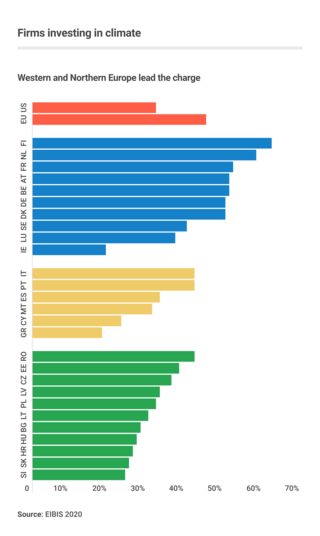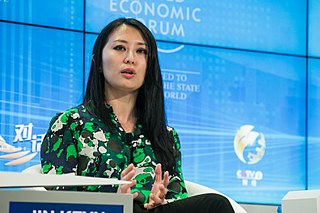
Robert Edward Rubin is an American retired banking executive, lawyer, and former government official. He served as the 70th U.S. Secretary of the Treasury during the Clinton administration. Before his government service, he spent 26 years at Goldman Sachs, eventually serving as a member of the board and co-chairman from 1990 to 1992.

Janet Louise Yellen is an American economist serving as the 78th United States secretary of the treasury since January 26, 2021. She previously served as the 15th chair of the Federal Reserve from 2014 to 2018. She is the first woman to hold either post, and has also led the White House Council of Economic Advisers.

Nouriel Roubini is a Turkish-born Iranian-American economic consultant, economist, speaker and writer. He is a Professor Emeritus since 2021 at the Stern School of Business of New York University.
A green economy is an economy that aims at reducing environmental risks and ecological scarcities, and that aims for sustainable development without degrading the environment. It is closely related with ecological economics, but has a more politically applied focus. The 2011 UNEP Green Economy Report argues "that to be green, an economy must not only be efficient, but also fair. Fairness implies recognizing global and country level equity dimensions, particularly in assuring a Just Transition to an economy that is low-carbon, resource efficient, and socially inclusive."

Anatole Kaletsky is an economist and journalist based in the United Kingdom. He has written since 1976 for The Economist, The Financial Times and The Times of London before joining Reuters and The International Herald Tribune in 2012. He has been named Newspaper Commentator of the Year in the BBC's What the Papers Say awards, and has twice received the British Press Award for Specialist Writer of the Year.

Daniel Howard Yergin is an American author and consultant within the energy and economic sectors. Yergin is vice chairman of S&P Global. He was formerly vice chairman of IHS Markit, which merged with S&P in 2022. He founded Cambridge Energy Research Associates, which IHS Markit acquired in 2004. He has authored or co-authored several books on energy and world economics, including the Pulitzer Prize–winning The Prize: The Epic Quest for Oil, Money, and Power, (1991) The Quest: Energy, Security, and the Remaking of the Modern World (2011), and The New Map: Energy, Climate, and the Clash of Nations (2020).

BlackRock, Inc. is an American multinational investment company. It is the world's largest asset manager, with $10 trillion in assets under management as of December 31, 2023. Headquartered in New York City, BlackRock has 78 offices in 38 countries, and clients in 100 countries. BlackRock is the manager of the iShares group of exchange-traded funds, and along with The Vanguard Group and State Street, it is considered to be one of the Big Three index fund managers. Its Aladdin software keeps track of investment portfolios for many major financial institutions and its BlackRock Solutions division provides financial risk management services. The head of Aladdin is Sudhir Nair. As of 2023, BlackRock was ranked 229th on the Fortune 500 list of the largest United States corporations by revenue.

The G20 or Group of 20 is an intergovernmental forum comprising 19 sovereign countries, the European Union (EU), and the African Union (AU). It works to address major issues related to the global economy, such as international financial stability, climate change mitigation and sustainable development.

Business action on climate change includes a range of activities relating to climate change, and to influencing political decisions on climate change-related regulation, such as the Kyoto Protocol. Major multinationals have played and to some extent continue to play a significant role in the politics of climate change, especially in the United States, through lobbying of government and funding of climate change deniers. Business also plays a key role in the mitigation of climate change, through decisions to invest in researching and implementing new energy technologies and energy efficiency measures.

Raghuram Govind Rajan is an Indian economist and the Katherine Dusak Miller Distinguished Service Professor of Finance at the University of Chicago's Booth School of Business. Between 2003 and 2006 he was Chief Economist and director of research at the International Monetary Fund. From September 2013 through September 2016 he was the 23rd Governor of the Reserve Bank of India. In 2015, during his tenure at the RBI, he became the Vice-Chairman of the Bank for International Settlements.

China has an upper middle income, developing, mixed, socialist market economy incorporating industrial policies and strategic five-year plans. It is the world's second largest economy by nominal GDP, behind the United States, and the world's largest economy since 2016 when measured by purchasing power parity (PPP).. China accounted for 19% of the global economy in 2022 in PPP terms, and around 18% in nominal terms in 2022. Historically, China was one of the world's foremost economic powers for most of the two millennia from the 1st until the 19th century. The economy consists of public sector enterprises, state-owned enterprises (SOEs) and mixed-ownership enterprises, as well as a large domestic private sector and openness to foreign businesses in their system. Post-1978 economic reforms China's average GDP growth had been over 10% annually for over three decades, and in some years even exceeded 13% annually. China is expected to remain the top contributor to global growth, at around 21% of global growth through 2029, higher than the G7 economies combined.

David Robert Malpass is an American economic analyst and former government official who served as President of the World Bank Group from 2019 to 2023. Malpass previously served as Under Secretary of the Treasury for International Affairs under Donald Trump, Deputy Assistant Treasury Secretary under Ronald Reagan, and Deputy Assistant Secretary of State under George H. W. Bush. He served as Chief Economist at Bear Stearns for the six years preceding its collapse.

Li Qiang is a Chinese politician. He became the 8th premier of the People's Republic of China in March 2023, having been elevated to the second-ranking member on the Chinese Communist Party (CCP) Central Committee Politburo Standing Committee in October 2022. Li was the party secretary for Shanghai City from 2017 to 2022 where he pursued pro-business policies and handled the response to the COVID-19 pandemic.
David Llewellyn-Smith is an Australian writer and independent publisher in the field of macroeconomics.
Gernot Wagner is an Austro-American climate economist at Columbia Business School, where he is a tenured full professor. He holds an AB and a PhD in political economy and government from Harvard University, as well as an MA in economics from Stanford University. A founding co-director of Harvard's Solar Geoengineering Research Program (2017-2019) he joined the faculty of New York University in 2019, moving to Columbia University in 2022. Wagner writes a monthly column for Project Syndicate, and is the co-author, with Martin L. Weitzman, of Climate Shock, a Top 15 Financial Times-McKinsey Business Book of the Year 2015. He won the "Austrian of the Year" award in 2022, awarded by Austrian daily Die Presse.

Jin Keyu is a Chinese economist. She serves as associate professor of economics at the London School of Economics and a World Economic Forum Young Global Leader, specialising in international macroeconomics and the Chinese economy. Her research focuses on global trade imbalances, global asset prices and China's economic growth model.

The COVID-19 pandemic has had far-reaching economic consequences including the COVID-19 recession, the second largest global recession in recent history, decreased business in the services sector during the COVID-19 lockdowns, the 2020 stock market crash, which included the largest single-week stock market decline since the financial crisis of 2007–2008 and the impact of COVID-19 on financial markets, the 2021–2023 global supply chain crisis, the 2021–2023 inflation surge, shortages related to the COVID-19 pandemic including the 2020–present global chip shortage, panic buying, and price gouging. It led to governments providing an unprecedented amount of stimulus. The pandemic was also a factor in the 2021–2022 global energy crisis and 2022–2023 food crises.
Green recovery packages are proposed environmental, regulatory, and fiscal reforms to rebuild prosperity in the wake of an economic crisis, such as the COVID-19 pandemic or the Global Financial Crisis (GFC). They pertain to fiscal measures that intend to recover economic growth while also positively benefitting the environment, including measures for renewable energy, efficient energy use, nature-based solutions, sustainable transport, green innovation and green jobs, amongst others.

The Chinese property sector crisis is a current financial crisis sparked by the 2021 default of Evergrande Group. Evergrande, and other Chinese property developers, experienced financial stress in the wake of overbuilding and subsequent new Chinese regulations on these companies' debt limits. The crisis spread beyond Evergrande in 2021 to such major property developers as Country Garden, Kaisa Group, Fantasia Holdings, Sunac, Sinic Holdings, and Modern Land.
Constance L. Hunter is an American chief economist and macroeconomics analyst. She is a former principal and chief economist at KPMG, and has served as president of the National Association for Business Economics (NABE). A member of several think tanks, including the Council on Foreign Relations, she is among the first economists to forecast various historic economic events, including the 2001 dot-com bubble, the 2007–2008 mortgage and credit crisis, and the economic impact of the COVID-19 pandemic.














